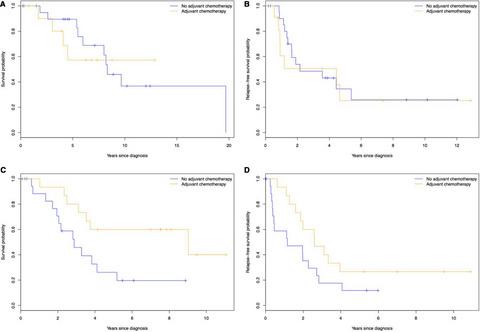当前位置:
X-MOL 学术
›
Cancer Med.
›
论文详情
Our official English website, www.x-mol.net, welcomes your feedback! (Note: you will need to create a separate account there.)
Impact of adjuvant chemotherapy on outcomes in appendiceal cancer.
Cancer Medicine ( IF 4 ) Pub Date : 2020-03-19 , DOI: 10.1002/cam4.3009 Bhaskar C Kolla 1 , Ashley Petersen 2 , Madhuri Chengappa 3 , Tulasi Gummadi 3 , Chitra Ganesan 3 , Wolfgang B Gaertner 4 , Anne Blaes 1
Cancer Medicine ( IF 4 ) Pub Date : 2020-03-19 , DOI: 10.1002/cam4.3009 Bhaskar C Kolla 1 , Ashley Petersen 2 , Madhuri Chengappa 3 , Tulasi Gummadi 3 , Chitra Ganesan 3 , Wolfgang B Gaertner 4 , Anne Blaes 1
Affiliation

|
BACKGROUND
The impact of using adjuvant chemotherapy following cytoreductive surgery (CRS) and hyperthermic intraperitoneal chemotherapy (HIPEC) in patients with appendiceal adenocarcinoma is not known. The aim of this study was to assess the impact of adjuvant chemotherapy following complete cytoreduction in patients with appendiceal adenocarcinoma.
METHODS
Retrospective medical record review of all patients with appendiceal adenocarcinoma treated at our institution between 2006 and 2015. Kaplan-Meier plots were used to summarize overall survival (OS) and relapse-free survival over time, and log-rank tests and Cox proportional hazards models were used to test for differences in survival between groups.
RESULTS
A total of 103 patients with appendiceal adenocarcinoma received care at our institution during the study period. Complete cytoreduction (cytoreductive score 0-1) was achieved in 68 patients (66%). Of these 68 patients, 26 received adjuvant chemotherapy. The most common regimens were capecitabine (n = 11), capecitabine plus oxaliplatin (n = 7), and 5-FU plus oxaliplatin (n = 6). Tumor histopathology and grade, and the ability to achieve complete cytoreduction were significant predictors of overall survival. The median OS for non-low-grade and well-differentiated tumor patients who received adjuvant chemotherapy following complete cytoreduction was 9.03 years, compared to 2.88 years for patients who did not receive adjuvant chemotherapy (P = .02). Among low-grade and well-differentiated tumor patients who underwent complete cytoreduction, there was no statistically significant difference in OS between those who received adjuvant chemotherapy and those who did not.
CONCLUSION
Adjuvant chemotherapy seems to have benefit in appendiceal cancer patients with non-low-grade or well-differentiated tumor type but not in low-grade or well-differentiated tumors.
中文翻译:

辅助化疗对阑尾癌预后的影响。
背景 肿瘤细胞减灭术 (CRS) 和腹腔热灌注化疗 (HIPEC) 后使用辅助化疗对阑尾腺癌患者的影响尚不清楚。本研究的目的是评估阑尾腺癌患者完全细胞减灭术后辅助化疗的影响。方法 回顾性回顾 2006 年至 2015 年间在我们机构接受治疗的所有阑尾腺癌患者的病历。使用 Kaplan-Meier 图总结总生存期 (OS) 和随时间的无复发生存期,以及时序检验和 Cox 比例风险模型用于测试组间生存率的差异。结果 在研究期间,共有 103 名阑尾腺癌患者在我们机构接受治疗。68 名患者 (66%) 实现了完全细胞减灭术(细胞减灭术评分 0-1)。在这 68 名患者中,26 名接受了辅助化疗。最常见的方案是卡培他滨(n = 11)、卡培他滨加奥沙利铂(n = 7)和 5-FU 加奥沙利铂(n = 6)。肿瘤组织病理学和分级,以及实现完全细胞减灭的能力是总生存率的重要预测因素。完全细胞减灭后接受辅助化疗的非低级别和高分化肿瘤患者的中位 OS 为 9.03 年,而未接受辅助化疗的患者的中位 OS 为 2.88 年(P = .02)。在接受完全细胞减灭术的低级别和分化良好的肿瘤患者中,接受辅助化疗的患者与未接受辅助化疗的患者的 OS 没有统计学上的显着差异。结论 辅助化疗似乎对非低级别或高分化肿瘤类型的阑尾癌患者有益,但对低级别或高分化肿瘤无效。
更新日期:2020-03-19
中文翻译:

辅助化疗对阑尾癌预后的影响。
背景 肿瘤细胞减灭术 (CRS) 和腹腔热灌注化疗 (HIPEC) 后使用辅助化疗对阑尾腺癌患者的影响尚不清楚。本研究的目的是评估阑尾腺癌患者完全细胞减灭术后辅助化疗的影响。方法 回顾性回顾 2006 年至 2015 年间在我们机构接受治疗的所有阑尾腺癌患者的病历。使用 Kaplan-Meier 图总结总生存期 (OS) 和随时间的无复发生存期,以及时序检验和 Cox 比例风险模型用于测试组间生存率的差异。结果 在研究期间,共有 103 名阑尾腺癌患者在我们机构接受治疗。68 名患者 (66%) 实现了完全细胞减灭术(细胞减灭术评分 0-1)。在这 68 名患者中,26 名接受了辅助化疗。最常见的方案是卡培他滨(n = 11)、卡培他滨加奥沙利铂(n = 7)和 5-FU 加奥沙利铂(n = 6)。肿瘤组织病理学和分级,以及实现完全细胞减灭的能力是总生存率的重要预测因素。完全细胞减灭后接受辅助化疗的非低级别和高分化肿瘤患者的中位 OS 为 9.03 年,而未接受辅助化疗的患者的中位 OS 为 2.88 年(P = .02)。在接受完全细胞减灭术的低级别和分化良好的肿瘤患者中,接受辅助化疗的患者与未接受辅助化疗的患者的 OS 没有统计学上的显着差异。结论 辅助化疗似乎对非低级别或高分化肿瘤类型的阑尾癌患者有益,但对低级别或高分化肿瘤无效。



























 京公网安备 11010802027423号
京公网安备 11010802027423号